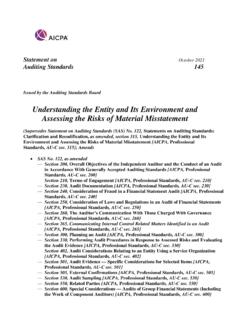Transcription of Global Recycled Standard 4.0 Certification Procedures
1 Global Recycled Standard Certification Procedures 2014 Textile Exchange 2 2013 Textile Exchange. All rights reserved. GRS, Global Recycled Standard , and the GRS Logo are trademarks of Textile Exchange. The GRS Certification Procedures supplement requirements for Certification bodies in GRS and are effective as of June 1, 2020. All audits conducted after September 1, 2020 shall be conducted using GRS Certification Procedures Cover photo credit NUREL, English is the official language of the Global Recycled Standard Certification Procedures .
2 In any case of inconsistency between versions, reference shall be made to the English version. Disclaimer Although reasonable care was taken in the preparation of this document, Textile Exchange and any other party involved in the creation of the document HEREBY STATE that the document is provided without warranty, either expressed or implied, of accuracy or fitness for purpose, AND HEREBY DISCLAIM any liability, direct or indirect, for damages or loss relating to the use of this document. This is a voluntary Standard and is not intended to replace the legal or regulatory requirements of any country.
3 Copyright This publication is protected by copyright. Information or material from this publication may be reproduced in unaltered form for personal, non-commercial use. All other rights are reserved. Information or material from this publication may be used for the purposes of private study, research, criticism or review permitted under the Copyright Act 1976. Any reproduction permitted in accordance with the Copyright Act 1976 shall acknowledge the Global Recycled Standard Certification Procedures as the source of any selected passage, extract, diagram or other information.
4 The GRS will undergo a revision process at least every five years. The GRS Certification Procedures will typically be revised alongside the GRS. The next revision is tentatively scheduled to begin in 2021. You may submit feedback to the Standard at any time; send to Points of clarification may be incorporated into GRS guidance documents prior to 2021. More substantive feedback or suggested changes will be collected and reviewed as part of the next revision of the Standard . Document Revision History Global Recycled Standard Certification Procedures released June 2020 Note: is the earliest version of this document in order to align with versions of the GRS.
5 Global Recycled Standard Certification Procedures 2014 Textile Exchange 3 Section A - General Information A1. About the Global Recycled Standard The Global Recycled Standard (GRS) is an international , voluntary, full product Standard that sets requirements for third-party Certification of Recycled content, chain of custody, social and environmental practices, and chemical restrictions. The goal of the GRS is to increase use of Recycled materials in products and reduce/eliminate the harm caused by its production. This is a voluntary Standard that is not intended to replace the legal or regulatory requirements of any country.
6 It is the responsibility of each operation to demonstrate compliance with all applicable laws and regulations related to marketing, labor, and business practices. Sellers of GRS products are advised to reference the allowed Recycled content claims in the countries of sale, to ensure that they are meeting all legal product claim requirements. Individual sites are certified by independent third-party Certification bodies using annual audits. Material is tracked from the farm to the final product, following the requirements of Textile Exchange s Content Claim Standard (CCS). For more information, please visit: A2.
7 About Textile Exchange The Global Recycled Standard is owned and managed by Textile Exchange. Textile Exchange is a Global non-profit that works closely with our members to drive industry transformation in preferred fibers, integrity and standards and responsible supply networks. We identify and share best practices regarding farming, materials, processing, traceability and product end-of-life in order to reduce the textile industry s impact on the world s water, soil and air, and the human population. A3. About the Certification Procedures The GRS Certification Procedures presents normative requirements for accreditation bodies and Certification bodies which are specific to the Global Recycled Standard .
8 These requirements are in addition to the requirements for all Textile Exchange standards , which can be found in ASR-101 Accreditation and Certification Procedures for Textile Exchange standards . The GRS Certification Procedures have been developed as a supplemental document to the existing Global Recycled Standard A more complete document will be developed alongside the GRS revision process which is scheduled to begin in 2021. In an effort to minimize the disruption to Certification bodies outside of a revision process, some criteria below are identified as recommended (use of the word should ).
9 Textile Exchange intends to update these criteria to be requirements (use of the word shall ) upon the revision to Global Recycled Standard Certification Procedures 2014 Textile Exchange 4 Section B - References B1. Terms and Definitions Refer to TE-101 Terms and Definitions for Textile Exchange standards and Related Documents for definitions of terms used in these Procedures . Defined terms are shown in italics in the first usage in this document, and in some other uses for clarity. B2. Reference Documents The following documents are key documents for conducting GRS Certification .
10 It is essential that they are used alongside this document. 1. GRS-101 Global Recycled Standard 2. GRS-201 GRS User Manual 3. GRS-301 GRS Logo Use & Claims Guide 4. RCS-101 Recycled Claim Standard ( RCS )1 5. ASR-101 Accreditation and Certification Procedures for Textile Exchange standards ( ACP ) 6. CCS-101 Content Claim Standard 7. TE-101 Terms and Definitions for Textile Exchange standards Section C - Requirements for Accreditation Bodies Additional requirements for accreditation bodies will be defined in of this document. Section D - Requirements for Certification Bodies D1.






